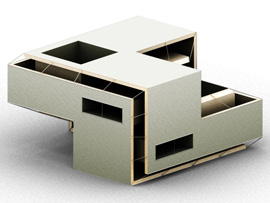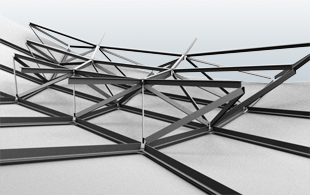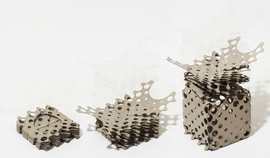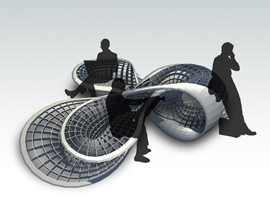Through research and development Proxy creates sophisticated design technology
Computation and Space

Topological House Study
Proxy’s focus is to understand how computation can assist architects in creating a new generation of structures and performances. We create simple computer codes that engage in the complexity of our environment and mediate the many functional demands on space. Our core mission is to provide insight and design materials in a field that we call “spatial computation” - techniques that allow us to conceive, create and construct space that is information rich and highly performative.
- Mark and Toru together direct the Columbia University Cloud Lab, a research-based laboratory that explores the design of our environment through emerging technologies in computing, interface and device culture.
- Proxy has developed geometric libraries for several software platforms. This work is partially documented in the Future of Architecture Software Project.
- Search HD compiles student research led by Proxy in "object oriented architecture," spaces and structures that are computed using modern software languages.
- We have initiated a technical paper archive, with links to critical papers for the emerging discourse of architectural computing.
- OpenPoly is a standard for storing and displaying 3D files on the web developed by Proxy.
- Proxy has written software for the iPhone, an exciting new platform for spatial computation and networking.
Planning & Decision Support
Visualization and real-time analytics are integral parts of the software Proxy builds. We support decisions by transforming information into intelligence through data mining and advanced visualization techniques. Projects include:- Abstract Data mining Project, a commissioned study that examines the dense web of relationships within an institution.
- Slum Lab Heat-mapping Project, a study in using GPS equipment to measure and visualize social risk.
Programming Algorithm, by Proxy
Sustainability
We believe that building culture should be an example of sustainability and stewardship of resources. Part of Proxy's focus is developing tools and methods to embed sustainability into the processes of making - from products, to architectural space to urban and social networks.Mark and Toru research sustainable building technologies at the Columbia GSAPP, where they have taught classes in building performance and environmental simulation.

Trusset, 3D Study Model of Space Frame Truss
- Digital Detailing: Testing & Analysis is a yearly seminar led by Proxy that examines building performance modeling and methodologies for creating radically sustainable architecture.
- The studio maintains a Technical Paper Archive, which aggregates information on building technology.
- Proxy collaborated on the Trusset, a project with the GSAPP Fabrication and Conservation Lab, an innovative building system that integrates sustainable features such as optimized PV placement and minimized material use.
Heatmap of GPS data, for Slum Lab
From 2006 to 2009, Proxy participated as technical directors in the Columbia GSAPP Sustainable Living Urban Model Laboratory. The Slum Lab investigates “informal” urban conditions throughout the world. Proxy contributed to the direction of studios that engaged local municipalities, institutions, community advocates and other stakeholders in Sao Paulo, Caracas and Utrecht. With its studio partners, Proxy used advanced tools to map, analyze and project new futures for informal communities.
- Proxy has released open-source tools to asses geo-technical risk-areas in informal settlements.
- Proxy co-authored and edited the Informal Toolbox, a publication that documents the work of the Slum Lab in Sao Paulo to design sustainable strategies for the future of the Paraisopolis slum.
Interface Technology
Our interaction with the environment is growing more complex with the proliferation of screens, interfaces and devices. We follow the latest in novel interface ideas and technologies to understand how our relationship with the environment can evolve.- Mark and Toru together direct the Columbia University Cloud Lab, a research-based laboratory that explores the design of our environment through emerging technologies in computing, interface and device culture.
Cloud Computing
The growing device culture is reshaping the way we create and interact with the environment. We are creating thoughtful and meaningful connections between the world of people, data and places through cloud technologies and application development.- Mark and Toru have partnered with Jeff and Anna Kenoff to create the Morpholio Project
- Mark and Toru together direct the Columbia University Cloud Lab, a research-based laboratory that explores the design of our environment through emerging technologies in computing, interface and device culture.
CNC Manufacturing

MUJI Paper Recycle Bin, Unfolding.
Proxy explores and utilizes CNC manufacturing techniques. Computer Numerical Control (CNC) is a broad term for production technologies that use computers to cut, form or build up physical objects.
- Mark and Toru co-teach a seminar on Rapid Prototyping at the Interactive Telecommunications Program and NYU, an internationally recognized new media program.
- The studio has contributed to research on CNC-based construction systems, in partnership with the Avery Fabrication and Conservation lab at Columbia University. One such project is the Trusset, a laser-cut metal space frame that can be assembled without specialized tools or labor.
- Proxy has published in peer-reviewed journals on the subjects of rationalization and construction of complex surfaces. We have led research projects that explored and tested tessellations of curved surfaces, manufacturing with metals, and digital design methodologies.

Melody Shafie Memorial
Copyright 2012 Proxy Design Studio LLC All Rights Reserved. For more information email inquiry @ proxyarch.com